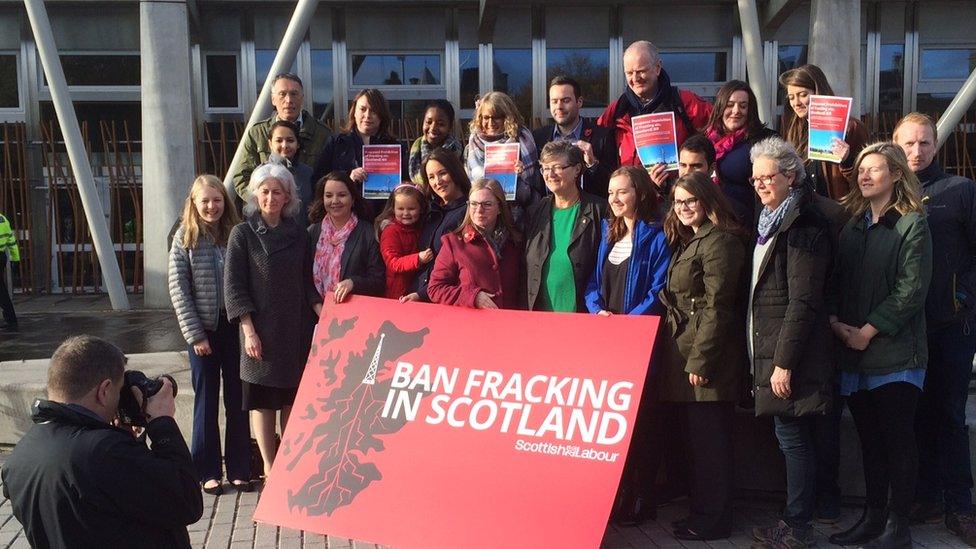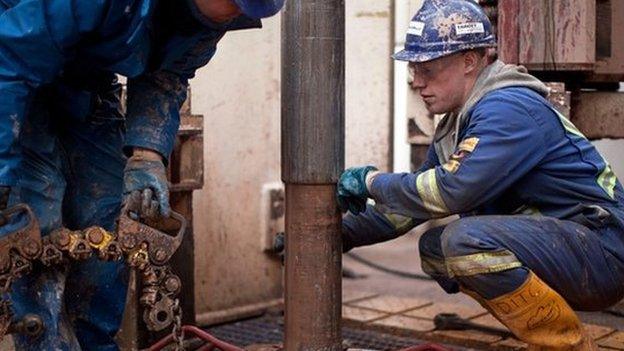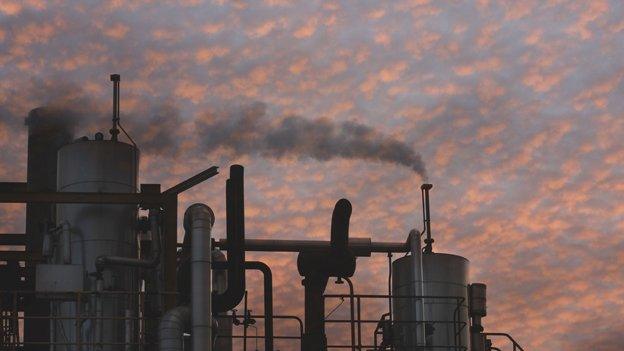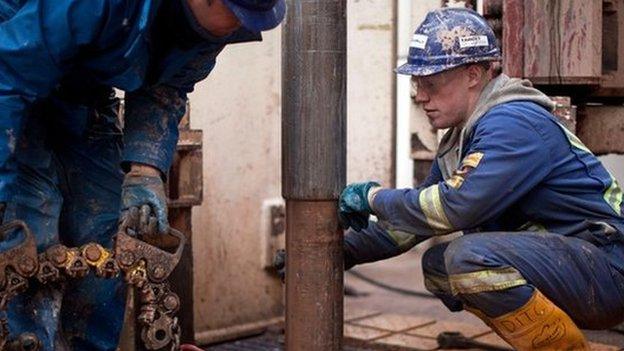Scottish Labour launch fracking ban members bill
- Published

Scottish Labour have launched a public consultation as part of Claudia Beamish's members bill
Scottish Labour is to lodge a Holyrood member's bill aiming to "change the law to ban fracking in Scotland".
Labour MSP Claudia Beamish has launched a public consultation as part of her bid to have the controversial practice banned north of the border.
The Scottish government has imposed a moratorium on fracking while collecting and considering scientific evidence.
Labour's announcement comes on the same day as the Paris Agreement to tackle climate change is ratified.
The SNP government at Holyrood is expected to publish its findings about unconventional oil and gas extraction soon, having recently formally distanced itself from Underground Coal Gasification.
The Scottish parliament voted to support an outright ban on fracking in June, although SNP members abstained from that vote.
Ms Beamish said the "climate science and evidence is clear" about fracking.
She said: "Scotland relying on fracking for our energy needs will lock us into an energy infrastructure based on fossil fuels long after our country needs to have moved to clean energy.
"SNP ministers now face an urgent choice - they can work with Labour to ban fracking, or they can work with the Tories to allow drilling under family homes in parts of central Scotland."

Fracking involves using a high-pressure water mixture to penetrate rock in order to release gas
The SNP's manifesto for the Holyrood election committed to there being no fracking in Scotland "unless it can be proven beyond doubt that there is no risk to health, communities or the environment". First Minister Nicola Sturgeon has declared herself "highly sceptical" about the technique, but has pledged to wait for scientific evidence.
A Scottish government spokesman said: "No fracking can take place in Scotland as a result of the moratorium on unconventional oil and gas extraction which the Scottish government has already put in place.
"We continue to take a cautious and evidence-led approach to unconventional oil and gas (UOG) and have commissioned a series of independent research projects to examine potential environmental, health and economic impacts to inform this approach which will be published on Tuesday, 8 November.
"We will thereafter engage the people of Scotland in a consultation before taking a decision on the future of UOG technology in Scotland."
The GMB Scotland union has thrown its weight behind fracking, which it calls "an opportunity to secure an affordable and indigenous gas supply" which could help tackle fuel poverty, reduce bills and create jobs.
Union secretary Gary Smith said: "Scotland needs a balanced energy supply to avoid the future prospect of power cuts, rising bills and frozen homes, but Labour is abandoning pragmatic politics in favour of the politics of protest - it's no wonder their polls continue to point south.
"This does nothing for the credibility of Scottish Labour, but more importantly it does nothing to protect the interests of people across Scotland."

What is fracking and why is it controversial?
The BBC's David Shukman explains how fracking works
Fracking is the process of drilling down into the earth before a high-pressure water mixture is directed at the rock to release the gas inside.
The extensive use of fracking in the US, where it has revolutionised the energy industry, has prompted environmental concerns.
The first is that fracking uses huge amounts of water that must be transported to the fracking site, at significant environmental cost.
The second is the worry that potentially carcinogenic chemicals used may escape and contaminate groundwater around the fracking site.
But the industry suggests fracking of shale gas could contribute significantly to the UK's future energy needs

Friends of the Earth Scotland said the members bill put forward by Labour was a "very important step" in the fight against fracking.
Head of campaigns Mary Church said: "While the current moratorium has halted the immediate threat of fracking, ultimately a ban is necessary.
"It's useful that Labour has kicked off a process that starts the thinking on how we actually ban fracking. We urge MSPs and parties to get behind this bill and work together to protect the environment and end uncertainty for communities."
The Scottish Greens also oppose fracking, with MSP Mark Ruskell calling it a "risky and unnecessary technology".
He added: "Labour's proposal for a Bill to implement a ban will add welcome pressure on the government, but it's not the only opportunity we have to prevent this dangerous industry taking hold in Scotland.
"The Scottish government is bringing forward a Climate Bill and I believe that gives us a better chance to rule out fracking and focus instead on safe, sustainable industries."
'Landmark day'
Environment Secretary Roseanna Cunningham said she would set out the government's proposals for its domestic climate change plan in January.
She said the ratifying of the Paris Agreement was a "landmark day in the global fight against climate change".
She said: "The first legally-binding agreement is now in force, which aims to hold global temperature rise this century to well below 2C and to pursue efforts to limit the rise even further to 1.5C.
"This is a significant step forward for collective global effort to tackle climate change and help protect our environment and planet for future generations.
"The Scottish government will continue to progress our world-leading, low-carbon ambitions which saw us exceed our 2020 emissions reductions target six years early."
- Published6 October 2016

- Published1 June 2016
